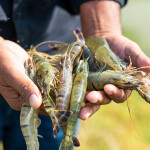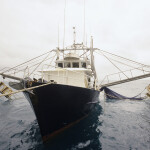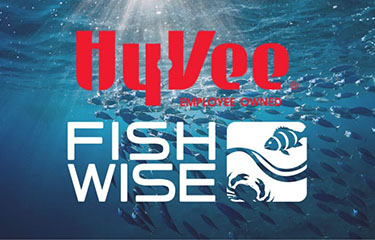For the second year in a row, West Des Moines, Iowa, U.S.A.-based grocery chain Hy-Vee and nonprofit sustainable seafood consultancy FishWise have collaborated to put together a tuna fishing-vessel transparency report.
In June 2022, Hy-Vee released its first report, which included a complete list of fishing vessels that supply its fresh, frozen, and canned private-label tuna.
“At Hy-Vee, we are committed to providing our customers with seafood that is sourced responsibly, which means doing our best to understand what is happening on the fishing vessels supplying our business with tuna,” Hy-Vee Vice President of Meat and Seafood Jason Pride said.
Following the production of the list, FishWise cross-referenced each vessel name, excluding handline vessels, with the ISSF Proactive Vessel Register, regional fisheries management organizations’ Illegal, unreported, and unregulated (IUU) fishing lists, a proprietary FishWise labor allegations list, and the Global Fishing Watch database of vessels believed to be engaged in IUU activity. The handline vessels were too small to be referenced within publicly available databases, as their size does not qualify them to receive International Maritime Organization (IMO) numbers, according to FishWise.
“Tuna are harvested globally, often in remote ocean regions where illegal fishing and human and labor rights abuses can occur without detection. The fishing vessel transparency activity is designed to shed light on the complexity of the company’s fresh, frozen, and canned tuna assortments,” Pride said. “By conducting this review, Hy-Vee is gaining greater visibility into the supply chain, identifying raw material providers, and proactively engaging with supply chain partners to prevent and mitigate risks for illegal fishing activities and social issues.”
In total, Hy-Vee sourced tuna from 4,706 handline vessels, 167 pole-and-line vessels, 44 longline vessels, 44 purse-seine vessels, one troll vessel, and one gillnet vessel over the 10-month period, according to FishWise Project Director Ethan Lucas.
“Only a few years ago, it was extremely difficult to collect data down to the vessel level for tuna. Now, with improved data access, we have the ability to not only identify the names of tuna fishing vessels but we can leverage publicly available tools, like Global Fishing Watch, to begin understanding the fishing history of those vessels and their behaviors at sea,” Lucas said. “When a business takes this level of responsibility for its supply chains, there is a strong incentive to ensure that raw material sourcing aligns with public commitments. This activity is part of implementing industry best practices for seafood supply chain due diligence and utilizing a holistic approach to improving seafood sustainability.”
The reporting effort is part of an ongoing sustainable seafood program initiated by Hy-Vee in 2011 to ensure 100 percent of its seafood was responsibly sourced by the end of 2015. Working with FishWise, Hy-Vee made several sourcing shifts, including a move to provide fresh and private-label farmed salmon that was rated either yellow or green under Monterey Bay Aquarium’s Seafood Watch program. In 2021, Hy-Vee adopted a new seafood supplier code of conduct aimed at upholding human and labor rights and made public its vendor expectations letter.
“It is fantastic to see a U.S. retailer digging into its tuna supply chains and making fishing vessel name information publicly available,” Global Tuna Alliance Executive Director Tom Pickerell said. “This is a huge step for the U.S. retail market.”
Following the release of its first vessel report, Hy-Vee immediately committed to an even larger, 12-month review, according to a Hy-Vee spokesperson.
“The vessels supplying catch to any major retailer like Hy-Vee is always changing, so reviews like this should be ongoing,” the spokesperson told SeafoodSource.
Greenpeace USA Senior Oceans Campaigner Marilu Cristina Flores applauded Hy-Vee’s move.
“We applaud Hy-Vee on this step towards transparency on the global tuna industry's practices at sea, which are notorious for human and environmental abuse,” Flores said. “Through this action and its expansion of consumer transparency, Hy-Vee is demonstrating its commitment to genuine progress. Greenpeace USA is calling on all retailers to take similar action to ensure consumers have access to vessel lists and full transparency on the origins of their tuna."
Despite its efforts, Hy-Vee was given a failing grade in the second edition of Greenpeace USA’s retailer report, released in March 2023. Of the 16 largest U.S. supermarket chains, only Aldi did not receive an “F” rating.
“For years, the global Greenpeace network has exposed the egregious human rights violations, forced labor, and illegal and environmentally damaging fishing practices that plague global tuna supply chains. These issues are worsened by the lack of traceability and transparency in these supply chains, which makes it nearly impossible to hold bad actors accountable,” Greenpeace said.







